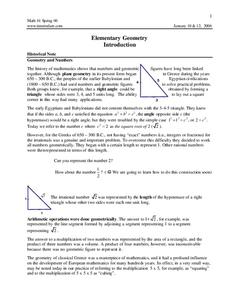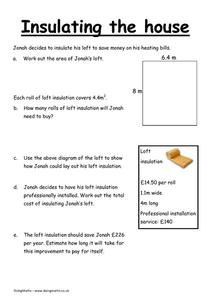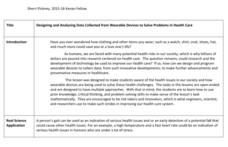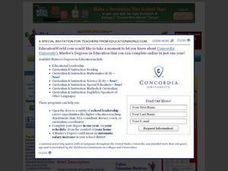Curated OER
Critical Thinking - Week 11
In this critical thinking worksheet, students complete problems which require abstract reasoning and logic. They complete logic puzzles involving sums of an array, finding the maximum number of integers under given conditions, and card...
Curated OER
Cover Up: Tools for Integrating Math and Engineering
Blend art, adolescent snacking habits, and math to create new cereal boxes. Secondary learners review scale drawings. They use this information to construct cereal boxes to scale and will compare their creation to the original product to...
Curated OER
Tell Us All: Tools for Integrating Math and Engineering
What a scam! Middle and high schoolers pose as journalists exposing consumer fraud. In this lesson, they write an article for a magazine using data collected during previous investigations (prior lessons) to defend their findings that a...
Math Mammoth
Grade 1 Worktext
Use graphing, counting, and number lines to help first graders learn about addition and subtraction. An array of worksheets and activities are an excellent resource for your math lesson, whether you are focusing on counting skills...
EngageNY
Tax, Commissions, Fees, and Other Real-World Percent Problems
Pupils work several real-world problems that use percents in the 11th portion of a 20-part series. The problems contain percents involved with taxes, commissions, discounts, tips, fees, and interest. Scholars use the equations formed for...
Practical Money Skills
Making Decisions
Money represents decisions: spending decisions, saving decisions, and investing decisions. Encourage young adults to think about the decisions they make with their money in a three-day unit about personal finance, consumer spending, and...
Mt. San Antonio Collage
Elementary Geometry
Your class may believe that geometry is a trial, but they don't know how right they are. A thorough math lesson combines the laws of logic with the laws of geometry. As high schoolers review the work of historical mathematicians and...
Doing Maths
Insulating the House
Finding the area of a rectangle is the focus of this metric worksheet. Here, mathematicians use their knowledge of finding the area of a shape in meters to discover how much material can fit inside a shape.
Kenan Fellows
Designing and Analyzing Data Collected from Wearable Devices to Solve Problems in Health Care
Wearable devices have become more the norm than the exception. Learners analyze data from a sample device with a regression analysis in a helpful hands-on lesson. Their focus is to determine if there is a connection between temperature...
Curated OER
Operation: Math
Students use critical thinking skills about math operations and practice using previously taught math skills. They solve a puzzle where they have to replace an * with the correct operation to complete the number sentence.
Curated OER
Dance Challenge: Calculate and Compare Speed by Measuring a Series of Dance Movements
Really neat! Kids choreograph a dance phrase and then measure the distance and speed of the phrase using a timer and a meter stick. They collect the data on a table which they use to determine an average. A series of observation and...
Math Warehouse
Theoretical Probability Activity
If you keep rolling a die, you'll roll a five exactly one-sixth of the time—right? A probability lesson prompts young mathematicians to roll a die 100 times and use the data to calculate empirical probabilities. They then compare...
Curated OER
Crazy for Cubes: Art and Science
Learners discuss Sol LeWitt and conceptual art, then analyze the differences in expressing a concept through model-based inquiry and aesthetic art criticism. They develop a geometric, scientific, or mathematical concept, then create an...
Curated OER
Get in Shape with Geometry
Using geoboards, computer programs, and hands-on manipulative materials, elementary schoolers engage in a study of two and three-dimensional geometric shapes. This lesson is chock full of good teaching ideas on the subject, and the...
Curated OER
Problem Solving---A Part of Everyday Thinking
Students demonstrate knowledge of the six basic steps to problem solving. They demonstrate ability to apply these six basic steps to problem solving by guiding other students in the solution of a given problem or set of problems.
EduGAINs
Making Savvy Consumer Choices
It's never too early to learn about grocery budgeting. Middle schoolers delve into the world of consumer math with a lesson that focuses on both healthy choices and real-world math applications. Groups work together to form a grocery...
PBS
KidVid: Fractions and Scale
Scale the challenge of learning about ratios and scales. Young mathematicians learn to incorporate fractional measurements when considering scales and scale factors. They use an interactive to investigate the concept and critically...
Curated OER
Patterns and Algebra - Modeling
Seventh grade math is so much fun! They solve 10 different problems that include using patterns to complete a table, describe the pattern, and identify the specific term in the pattern for each. Then they give a description of the...
Houghton Mifflin Harcourt
Customary Units of Capacity - Problem Solving 12.3
Math majors need not only to be able to solve problems, but also apply the skills to real-world situations. On this worksheet, they solve five problems in which they must convert units of capacity or liquid volume. Give this to your...
Houghton Mifflin Harcourt
Convert Customary Units of Length
Sports fans will really enjoy this unit conversion assignment. A table of standard measurements for football-related equipment is presented as the data for solving six word problems. For all of the problems, players will need to convert...
Virginia Department of Education
Exponents
Expand your knowledge of exponents with an activity that promotes critical thinking and comparison skills. Middle and high schoolers compare numbers written in expanded and exponential form and explain their strategies for solving...
Centers for Disease Control and Prevention
Major Disparities in Adult Cigarette Smoking Exist Among and Within Racial and Ethnic Groups
Data indicates that some racial groups smoke more than others, and that with that racial group, there are smaller groups whose smoking habits vary as well. Secondary learners read a graph that details the differences between the Asian...
Rainforest Alliance
Investments in Forest Carbon
One hundred metric tons of CO2 can accumulate in one acre of forest over time—that's a lot of carbon! In the activity, groups of middle school learners determine what makes forests important. They then solidify the concept by using a...
Curated OER
Transportation Math
Students practice their problem solving skills. In this addition and subtraction lesson, students solve story problems regarding the delivery of consumer goods.

























